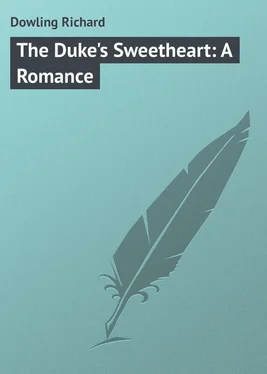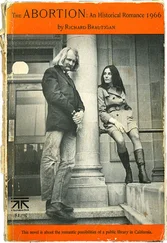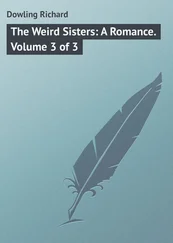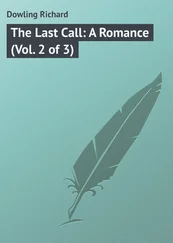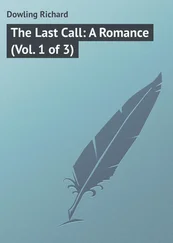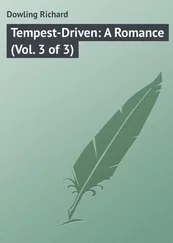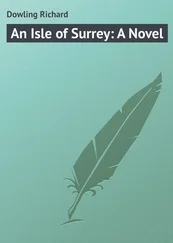Richard Dowling - The Duke's Sweetheart - A Romance
Здесь есть возможность читать онлайн «Richard Dowling - The Duke's Sweetheart - A Romance» — ознакомительный отрывок электронной книги совершенно бесплатно, а после прочтения отрывка купить полную версию. В некоторых случаях можно слушать аудио, скачать через торрент в формате fb2 и присутствует краткое содержание. Издательство: Иностранный паблик, Жанр: foreign_prose, на английском языке. Описание произведения, (предисловие) а так же отзывы посетителей доступны на портале библиотеки ЛибКат.
- Название:The Duke's Sweetheart: A Romance
- Автор:
- Издательство:Иностранный паблик
- Жанр:
- Год:неизвестен
- ISBN:нет данных
- Рейтинг книги:3 / 5. Голосов: 1
-
Избранное:Добавить в избранное
- Отзывы:
-
Ваша оценка:
- 60
- 1
- 2
- 3
- 4
- 5
The Duke's Sweetheart: A Romance: краткое содержание, описание и аннотация
Предлагаем к чтению аннотацию, описание, краткое содержание или предисловие (зависит от того, что написал сам автор книги «The Duke's Sweetheart: A Romance»). Если вы не нашли необходимую информацию о книге — напишите в комментариях, мы постараемся отыскать её.
The Duke's Sweetheart: A Romance — читать онлайн ознакомительный отрывок
Ниже представлен текст книги, разбитый по страницам. Система сохранения места последней прочитанной страницы, позволяет с удобством читать онлайн бесплатно книгу «The Duke's Sweetheart: A Romance», без необходимости каждый раз заново искать на чём Вы остановились. Поставьте закладку, и сможете в любой момент перейти на страницу, на которой закончили чтение.
Интервал:
Закладка:
"'They went to The Holborn, and had a substantial luncheon, and a bottle of burgundy between them. Belmore paid the, bill, and gave the waiter half-a-crown. He said "Thank you, sir. Very much obliged, indeed;" and flew for Belmore's ulster as though Satan were at his heels.
"'When they got into the street, Belmore called a hansom, and told the man to drive to Jackson and Connington, Lothbury. As soon as the cab drew up, De Montmorency said:
"'"I'll wait for you in the cab. I'll ask the driver to let down the glass, and I shall be all right and comfortable."
"'"But won't you come up with me?"
"'"No, I think it better not, I am almost sure the lawyers do not want me, and I should not like to feel that, if I went up. I shall be quite comfortable. Run away now, Belmore, and hurry back and tell me you are the real King of Burmah."
"'Belmore did not care to force him against his wish; so he stepped out of the cab and walked into the house and upstairs.
"'He had been gone about half an hour, when a man dashed out of that door and rushed at the hansom, crying:
"'"Engaged?"
"'"Yes, sir."
"'"By whom?"
"'"Tall gentleman in ulster coat-gone upstairs half an hour ago."
"'"All right! You'll do! He's taken suddenly ill, and I want you to drive me for a doctor. The job is a sovereign, remember!"
"'"But there's a gentleman inside."
"'"De Montmorency knocked at the glass, and the driver drew it up. De Montmorency said to the man on the pathway:
"'"Mr. Belmore ill, did you say?"
"'"Yes, sir; taken suddenly ill."
"'De Montmorency leaped out, crying:
"'"Jump in, jump in! I'll run up and see him."
"'When he reached the room where Mr. Jackson and his partner stood, he found Belmore lying on a couch deadly white.
"'"Mr. de Montmorency, this is my partner, Mr. Connington. Mr. Connington, this is Mr. de Montmorency, a friend of his Grace."
"'"His Grace be-!" said De Montmorency. "I am a friend of Mr. Belmore. What's the matter with him?"
"'"His Grace the Duke of Fenwick has fainted upon hearing the honours and wealth that have suddenly come upon him.'*
"'"And who, in the name of Heaven, is His Grace the Duke of Fenwick?"
"'"The person you knew as Mr. Antony Belmore is Duke of Fenwick, with a rent-roll of ninety thousand a year!"'"
Here Cheyne finished reading, and throwing down the proofs, said:
"Well, May, what do you think of it?"
"Oh, I think it very clever indeed, only-only-"
"Yes, my ungrateful and critical sweetheart?"
"Only-only-doesn't everyone know who the heir to a dukedom is, like the heir to a kingdom?"
"No; everyone knows nothing."
"But doesn't the Duke himself know who his heir is? Or doesn't the House of Commons, or someone?"
"Dukes know absolutely nothing at all, and the House of Commons knows less."
While Charles Cheyne was reading chapter fifty-two in the little conservatory to his darling sprightly May, the Duke of Shropshire, having voted against the detested Radicals, was returning by express train to Silverview Castle, and Edward Graham was seated in front of the Beagle Inn, Anerly, painting the peaceful valley with Anerly Church in the near middle distance.
CHAPTER V.
UNDER ANERLY BRIDGE
Although the view from the portico in front of the Beagle Inn at Anerly was very lovely, it would by no means make a good picture. It was too broad and monotonous and scattered. There was no composition in it. The pleasure derived from looking down that peaceful slope and valley was gained by glancing at it unconsciously from several points of view rather than from any particular one. If you fixed your eyes on the central or road line, no doubt you commanded Anerly Church and some fine trees and the wide plain below; but then there was no right-hand or left-hand frame to the picture, and the effect was insipid, if not distracting. If you looked through the trees you had the broad valley and the silver streak of stream; but you missed the church and the pine-clad slope which lent the romantic air to the whole scene.
Edward Graham was not a great artist. He was one of those indolent men who study art no more than the study yields pleasure. He liked painting and artists, but preferred the society of artists to that of a lonely easel, a laborious sketch-book. He was a Bohemian born, not made. He loved art for what it brought him from without more than for any divine joy it aroused within. By fortune he was poor, and by nature idle. He did not like doing anything; but of all occupations that could bring him money he disliked painting least. Therefore he painted for his bread. If he had been rich-so much did he enjoy the atmosphere of art, and the companionship of those who follow art-he would have painted all the same, that he might be entitled to smoke pipes and discuss pictures with better painters than he. He was one of those men who, although earning their bread by a profession, are amateurs to the last, one of those to whom talk of art is dearer than the use of artist's tools. He always wore a brown velveteen coat, a soft hat with a broad brim, and a Cambridge-blue tie. He was about twenty-eight years of age, of medium height, lightly built, and of dark complexion; the most remarkable thing in his face being a pair of large, round, brown eyes. In manner he was cordial, enthusiastic, almost boisterous.
The morning after Edward Graham had heard the story of Stephen Goolby's temptation was bright with dew and sunshine, and sweet with spices from the pine-trees and brisk balm of the meadows. Young Graham was on a walking tour. In his knapsack he carried two clean flannel shirts, a few collars, toilette brushes, and a comb; a couple of pair of thick knitted stockings, and a razor and strop; for Edward Graham shaved his chin and cheeks, wearing no hair on his face but a pair of moustaches. At the back of his knapsack was strapped a small rectangular japanned case, containing a large sketching-pad, three small canvases, a mahlstick, moist water-colours, oil-colours, brushes, and so on. A stout walking-stick he carried was a folded-up easel, and his knapsack served as a seat when he was painting or sketching in the open air.
On this beautiful morning in June Graham rose early, and, having filled and lighted a briar-root pipe, strolled out in front of the Beagle Inn. He took a leisurely survey of the place, drew his hat knowingly on the side of his head, as though to show the crows-the only living things in view-that Nature might be very clever in her way, but that she could not impose on him, and that he was about to probe her to the core.
He lounged indolently down the winding road that led by Anerly Church to the valley and broad stream beyond. He had his hands in the pockets of his velveteen shooting-jacket, as, with hat on one side and head on the other, and legs moving loosely and without any premeditation, he strolled down the hill.
As soon as he got near Anerly Church he paused, and, turning half round, looked up the pine-clad slope. After a careful scrutiny of a few minutes, he shook his head gloomily at it, as though he had expected and deserved much better treatment at its hands. Then, drawing his jacket tightly round his hips in a leisurely and dejected way, he continued his descent.
When he got as far as Anerly Church he paused again and looked round him. There was a slight relaxation of his critical stare, and a glance of approval in his large brown eyes. The approval was not so much of the landscape as of the fact that he, Edward Graham, approved of himself for having found out a suitable standpoint from which to make a picture of the place. For, give Nature all her due, what was the good of setting forth fair landscapes if no one with an artistic eye and artistic skill came her way to paint them?
Читать дальшеИнтервал:
Закладка:
Похожие книги на «The Duke's Sweetheart: A Romance»
Представляем Вашему вниманию похожие книги на «The Duke's Sweetheart: A Romance» списком для выбора. Мы отобрали схожую по названию и смыслу литературу в надежде предоставить читателям больше вариантов отыскать новые, интересные, ещё непрочитанные произведения.
Обсуждение, отзывы о книге «The Duke's Sweetheart: A Romance» и просто собственные мнения читателей. Оставьте ваши комментарии, напишите, что Вы думаете о произведении, его смысле или главных героях. Укажите что конкретно понравилось, а что нет, и почему Вы так считаете.
